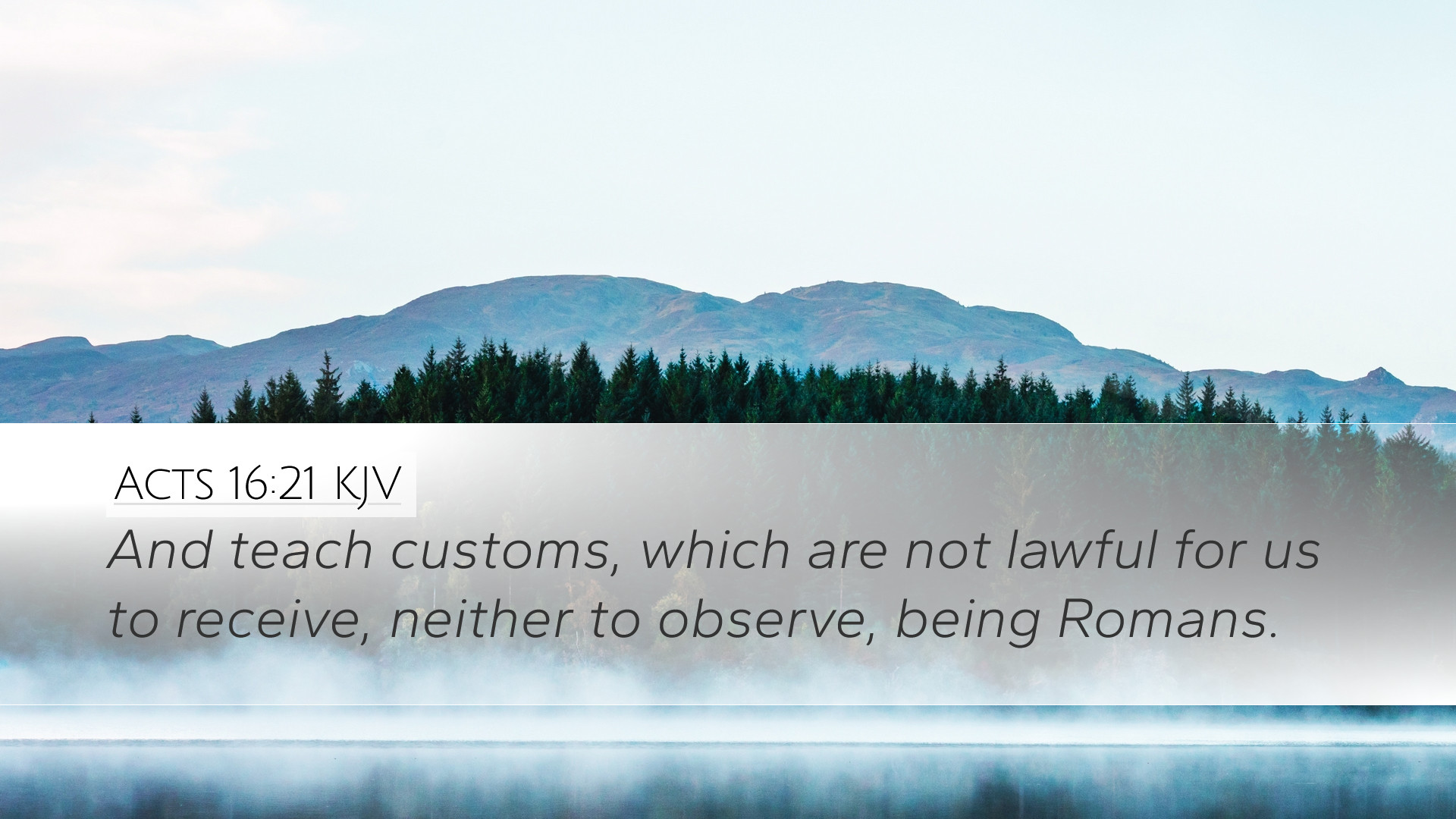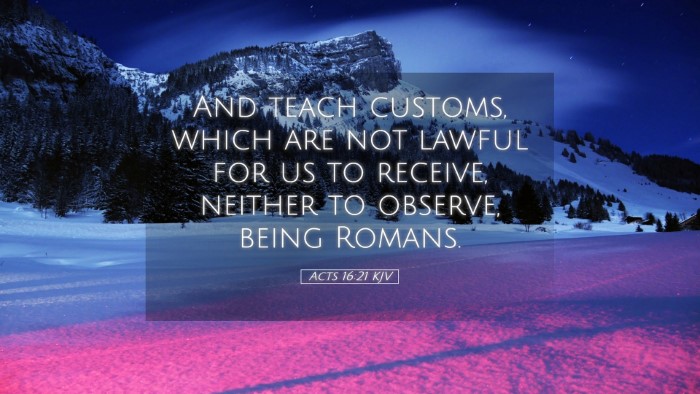Commentary on Acts 16:21
Verse Reference: Acts 16:21 - "And teach customs, which are not lawful for us to receive, neither to observe, being Romans."
Contextual Overview
The Book of Acts is known for its detailed account of the early church and the spread of the Gospel. Acts 16 stands out in the narrative as it introduces Paul’s mission in Philippi, a crucial city in Macedonia. This mission is marked by the conversion of Lydia and the imprisonment of Paul and Silas.
Cultural and Historical Background
Understanding the Roman context of the early church is essential for interpreting this verse. Philippi was a Roman colony and a significant commercial center that housed many Roman citizens. The customs referred to by the accusers in this verse point to the clash between the Greco-Roman religious practices and the teachings of Christianity.
Commentary Insights
Matthew Henry's Commentary
Matthew Henry highlights the twofold accusation against Paul and Silas—being Jews and introducing customs contrary to Roman law. His commentary suggests that the opponents aimed to instill fear among the Roman citizens by portraying Paul and Silas as dangerous outsiders disrupting societal norms. Henry points out that this incident showcases not only the preconceptions of Hellenistic society about Judaism but also the early church's struggle against prevailing cultural and religious standards.
Albert Barnes' Commentary
Albert Barnes emphasizes the implications of Roman law in the context of the spread of Christianity. He explains that the Romans were particularly sensitive to any teachings that seemed to challenge their established customs or authority. Barnes notes that the phrase "which are not lawful for us to receive" indicates a strong societal push to reject anything that did not align with Roman legal frameworks or cultural practices. This resistance illustrates the growing tensions between early Christians and Roman authorities, as their message inherently challenged the civic religion of the empire.
Adam Clarke's Commentary
Adam Clarke provides a deeper examination of the socio-political landscape surrounding this passage. He considers the impact of the Roman legal system on spiritual expression and highlights the irony in the accusers’ statement. Clarke posits that the accusers' use of "us" reflects a sense of superiority and entitlement among Roman citizens, suggesting that they viewed their cultural preferences as inherent rights. Clarke also stresses that the missionary efforts of Paul and Silas were aimed at both Jews and Gentiles, indicating the universal nature of the Gospel despite the backlash against it.
Theological Reflections
This verse serves as a pivotal moment in understanding the friction between Christianity and the Roman Empire. The initial accusations against the apostles reveal the exclusive nature of Roman customs and the challenge posed by the inclusive message of the Gospel. Theological reflections drawn from this passage suggest several key themes:
- The Conflict of Cultures: The early Christians faced a dual challenge of maintaining their faith while living within a predominantly pagan society.
- Resistance to Change: The firm resistance exemplified by the Roman citizens reveals a general human tendency to cling to the familiar, even when new truths arise.
- Boldness in Witness: Despite opposition, the apostles did not shy away from their mission, underscoring the conviction that the Gospel must be proclaimed, regardless of societal backlash.
Practical Applications
For contemporary pastors, students, and theologians, Acts 16:21 serves as a hypothetical mirror reflecting modern-day challenges in proclaiming the Gospel. The following applications may be drawn:
- Cultural Sensitivity: Understanding the cultural context in which one ministers is crucial for effective evangelism and discipleship.
- Conviction and Courage: Like Paul and Silas, believers are called to demonstrate boldness in their faith, even when facing societal pressure.
- Dialogue with Society: Engaging meaningfully with differing worldviews requires wisdom and love, even when encountering resistance.
Conclusion
Acts 16:21 not only reflects the historical tensions between early Christians and Roman authorities but also serves as a timeless reminder of the struggles faced by those who attempt to live out their faith in a complex society. Insights from public domain commentaries enrich our understanding and challenge us to remain steadfast in our witness while navigating the difficulties of cultural and legal opposition.


